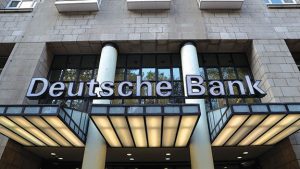Bloomberg
Deutsche Bank AG scrapped an efficiency target for the year and warned a key profitability goal was getting harder to reach, as the economy weakens and the war in Ukraine, surging inflation and litigation drive up expenses.
The muted outlook, published on Wednesday along with second-quarter results, overshadowed a strong performance at the corporate bank, which benefited from higher interest rates, as well as in fixed-income trading, which beat Wall Street in a volatile market.
Chief Executive Officer Christian Sewing has so far stuck with the key pledge of his four-year turnaround plan, an 8% return on tangible equity this year. He’s benefited from a years-long trading rally and, more recently, rate increases by the European Central Bank and the Federal Reserve. But with the economy slowing, inflation showing no signs of easing and multiple other challenges piling up, prospects for the rest of the year have clouded over.
“We see some of the challenges lying ahead and we’ve reflected that in our outlook,†Chief Financial Officer James von Moltke said in an interview on Bloomberg TV. Deutsche Bank “had some setbacks in the first half that were outside our control and we continue to see pressure in the second half of the year on expenses.â€
Pretax profit in the second quarter, at 1.55 billion euros, came in well ahead of analyst estimates for 1.39 billion euros. That’s the best second quarter since 2011, Deutsche Bank said.
At the corporate bank, higher rates fueled a 26% increase in net revenue to 1.6 billion euros, the highest since the unit was formed in 2019 when Sewing unveiled his restructuring plan. The private bank, which houses the lender’s retail operations, saw revenue increase by 7% from a year earlier. Both businesses had struggled with the impact of negative interest rates in Europe, which the ECB ended last week.
Fixed-income trading, which drove much of Deutsche Bank’s rebound under Sewing, rose 32% from a year earlier, capping two years of market-share gains. The five biggest US investment banks, which all reported second-quarter results earlier this month, saw fixed-income trading rise 31% on average.
At the same time, revenue from advising on deals and capital raisings slumped 63% from a year earlier, prompting Deutsche Bank to lower its guidance for the investment bank, the biggest revenue contributor. The lender said it now expects the unit’s revenues to be essentially flat this year, compared with a previous guidance for a slightly higher top line.
Von Moltke also flagged a more cautious view of the trading environment, saying in the interview that “the market needs a direction and that hasn’t been as present in the late June, early July period as in the rest of the year.â€
Deutsche Bank said it expects a more challenging second half with the economy weakening. That’s driving up provisions for bad loans, adding to rising costs from inflation, litigation and higher contributions to the EU’s bank resolution fund.
The lender said it won’t be able to reach a target for a cost-income ratio of 70% this year, predicting instead a figure in the “mid- to low-70s.†Provisions tied to probes into staff use of unapproved personal devices likely contributed to the headwinds.
Deutsche Bank is still the target of a probe conducted by US regulators to see whether staff’s use of private communication channels violated industry rules. Various US banks have said they’re expecting to pay about $200 million each to settle the same probe and UBS Group AG on Tuesday became the latest European bank to flag a potential hit.
 The Gulf Time Newspaper One of the finest business newspapers in the UAE brought to you by our professional writers and editors.
The Gulf Time Newspaper One of the finest business newspapers in the UAE brought to you by our professional writers and editors.
